词句精讲精练
Module8Storytime词句精讲精练

Module8Storytime词句精讲精练Module 8 Story time词句精讲精练1. asleepasleep 是形容词,意为“睡着的” ,但它只能作表语,不能⽤very 修饰,只能⽤much、fast 等词修饰。
它作定语时,只能位于所修饰词之后。
反义词为“awake ”。
例如:Don'ttalk loud when others are asleep. 别⼈睡着的时候不要⼤声说话。
The boy asleep is my brother. 那个睡着的男孩是我弟弟。
【拓展】be asleep、go to sle ep、go to bed 和sleep 的辨析:(1)be asleep表⽰“睡着”的状态。
例如:The baby is fast asleep. 那个婴⼉睡得很熟。
(2)go to sleep = get to sleep = fall asleep 强调进⼊梦乡的动作。
例如:He was just falling asleep when there was a loud knock at the door.他刚睡着,就有⼈使劲敲门。
I don't know when I went to sleep / got to sleep last night. 我不知道昨晚什么时候睡着的。
(3)go to bed意为“就寝,上床睡觉”,着重指上床准备睡觉的动作。
⼀般来说,go to bed在前,然后才go to sleep 或fall asleep。
例如:He usually goes to bed at ten and goes to sleep five minutes later.他通常⼗点上床睡觉,五分钟后⼊睡。
(4)sleep强调“睡觉”动作,是延续性动词,可与表⽰时间段的状语连⽤。
例如:Did you sleep well last night? 你昨晚睡得好吗?2. pickpick意为“采,摘”,常⽤于词组“ pick up ”,意为“拾起,捡起”,当宾语为代词时,宾语应放在pick 和up 中间;当宾语为名词时,宾语可放中间,也可放在后⾯。
九年级英语上册 Review of Unit 1-2词句精讲精练 (新版)仁爱版
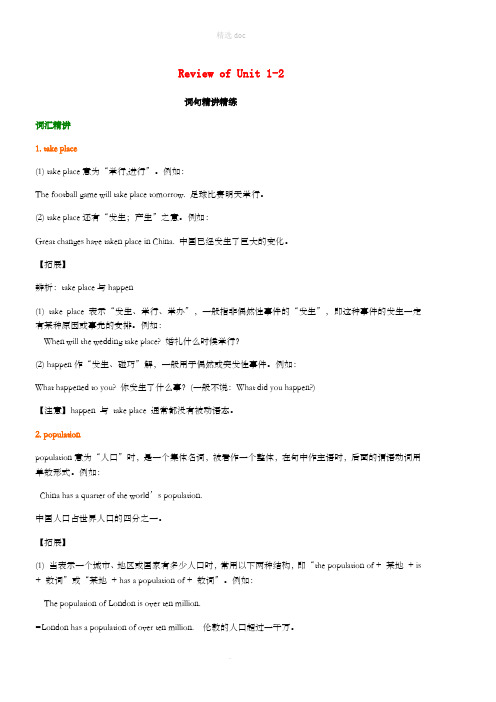
Review of Unit 1-2词句精讲精练词汇精讲1. take place(1) take place意为“举行,进行”。
例如:The football game will take place tomorrow. 足球比赛明天举行。
(2) take place还有“发生;产生”之意。
例如:Great changes have taken place in China. 中国已经发生了巨大的变化。
【拓展】辨析:take place与happen(1) take place 表示“发生、举行、举办”,一般指非偶然性事件的“发生”,即这种事件的发生一定有某种原因或事先的安排。
例如:When will the wedding take place? 婚礼什么时候举行?(2) happen作“发生、碰巧”解,一般用于偶然或突发性事件。
例如:What happened to you? 你发生了什么事?(一般不说:What did you happen?)【注意】happen 与take place 通常都没有被动语态。
2. populationpopulation意为“人口”时,是一个集体名词,被看作一个整体,在句中作主语时,后面的谓语动词用单数形式。
例如:China has a quarter of the world’s population.中国人口占世界人口的四分之一。
【拓展】(1) 当表示一个城市、地区或国家有多少人口时,常用以下两种结构,即“the population of + 某地+ is + 数词”或“某地+ has a population of + 数词”。
例如:The population of London is over ten million.=London has a population of over ten million. 伦敦的人口超过一千万。
(2) population可与large,small搭配,但不能与many,few搭配。
译林版九年级上初三英语第一单元词句精讲精练(含答案)
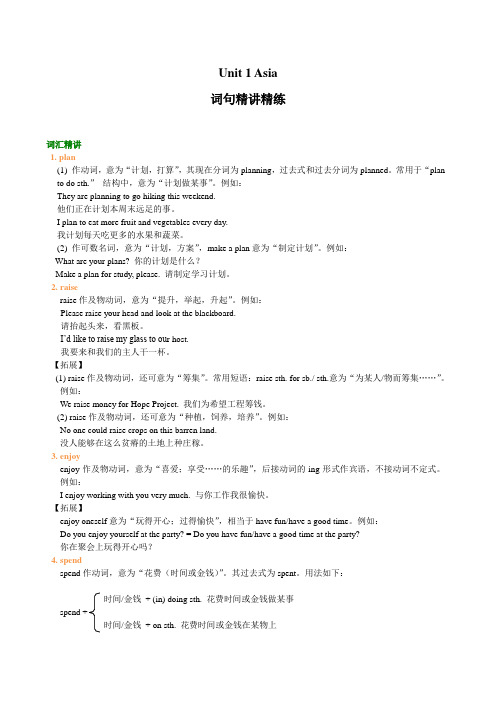
Unit 1 Asia词句精讲精练词汇精讲1. plan(1) 作动词,意为“计划,打算”,其现在分词为planning,过去式和过去分词为planned。
常用于“planto do sth.”结构中,意为“计划做某事”。
例如:They are planning to go hiking this weekend.他们正在计划本周末远足的事。
I plan to eat more fruit and vegetables every day.我计划每天吃更多的水果和蔬菜。
(2) 作可数名词,意为“计划,方案”,make a plan意为“制定计划”。
例如:What are your plans? 你的计划是什么?Make a plan for study, please. 请制定学习计划。
2. raiseraise作及物动词,意为“提升,举起,升起”。
例如:Please raise your head and look at the blackboard.请抬起头来,看黑板。
I’d like to raise my glass to ou r host.我要来和我们的主人干一杯。
【拓展】(1) raise作及物动词,还可意为“筹集”。
常用短语:raise sth. for sb./ sth.意为“为某人/物而筹集……”。
例如:We raise money for Hope Project.我们为希望工程筹钱。
(2) raise作及物动词,还可意为“种植,饲养,培养”。
例如:No one could raise crops on this barren land.没人能够在这么贫瘠的土地上种庄稼。
3. enjoyenjoy作及物动词,意为“喜爱;享受……的乐趣”,后接动词的-ing形式作宾语,不接动词不定式。
例如:I enjoy working with you very much. 与你工作我很愉快。
八年级英语下册《Review of Units 5-6》词句精讲精练 (新版)仁爱版-(新版)仁爱版

Review of Units 5-6词句精讲精练词汇精讲1. also, too&eitheralso; too与either都有“也”的意思,但用法不同:(1)also用于肯定句,位置通常位于句中,比too更为正式。
例如:I also go to work by bike. 我也骑自行车上班。
(2)too用于肯定句且置于句末,其前用逗号隔开;在简略答语中too常置于代词的宾格形式之后。
例如:— Tom likes music and Mary does, too. 汤姆喜欢音乐,玛丽也喜欢。
— Me, too. 我也是。
Jack is a worker, too. Jack也是工人。
(3)either用于否定句且置于句末,其前用逗号隔开。
例如:He can’t swim. I can’t swim, either. 他不会游泳,我也不会。
2. though&although(1)用作连词,表示“虽然”,二者可以互换使用,但although比though更为正式。
例如:Though/Although it was raining, we still went there. 虽然下着雨,但我们还是去了那里。
(2)although一般不用作副词,而though可用作副词,且一般放在句末(不放在句首),意为“可是,不过”。
例如:It’s hard work; I enjoy it, though. 工作很辛苦,可是我很喜欢。
We all tried our best. We lost the game, though. 我们都尽力最大努力,但我们还是输了。
(3)在as though(好像,仿佛),even though(即使,纵然)等固定短语中不能用although。
例如: He talks as though he knew everything. 他夸夸其谈,好像无所不知。
3. proudproud 是形容词,常用结构:be proud of sth. 意为“以……而骄傲”。
译林版七年级上初一英语第四单元词句精讲精练(含答案)
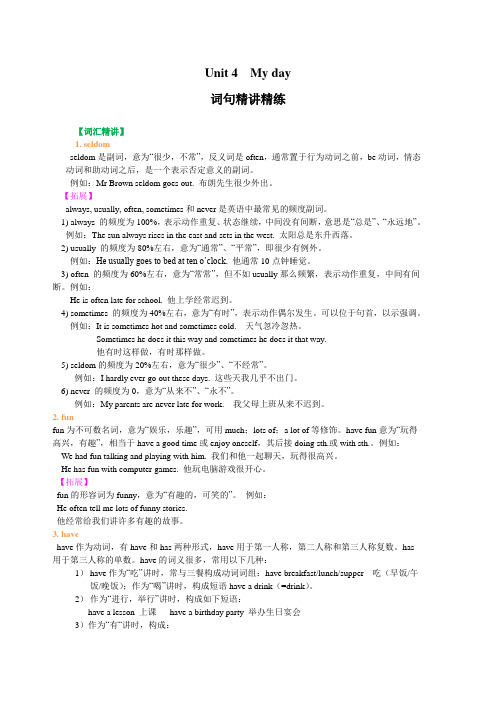
Unit 4 My day词句精讲精练【词汇精讲】1. seldomseldom是副词,意为“很少,不常”,反义词是often,通常置于行为动词之前,be动词,情态动词和助动词之后,是一个表示否定意义的副词。
例如:Mr Brown seldom goes out. 布朗先生很少外出。
【拓展】always, usually, often, sometimes和never是英语中最常见的频度副词。
1)always 的频度为100%,表示动作重复、状态继续,中间没有间断,意思是“总是”、“永远地”。
例如:The sun always rises in the east and sets in the west. 太阳总是东升西落。
2) usually 的频度为80%左右,意为“通常”、“平常”,即很少有例外。
例如:He usually goes to bed at ten o’clock. 他通常10点钟睡觉。
3) often 的频度为60%左右,意为“常常”,但不如usually那么频繁,表示动作重复,中间有间断。
例如:He is often late for school. 他上学经常迟到。
4) sometimes 的频度为40%左右,意为“有时”,表示动作偶尔发生。
可以位于句首,以示强调。
例如:It is sometimes hot and sometimes cold. 天气忽冷忽热。
Sometimes he does it this way and sometimes he does it that way.他有时这样做,有时那样做。
5) seldom的频度为20%左右,意为“很少”、“不经常”。
例如:I hardly ever go out these days. 这些天我几乎不出门。
6) never 的频度为0,意为“从来不”、“永不”。
例如:My parents are never late for work. 我父母上班从来不迟到。
译林版九年级上初三英语第二单元词句精讲精练(含答案)
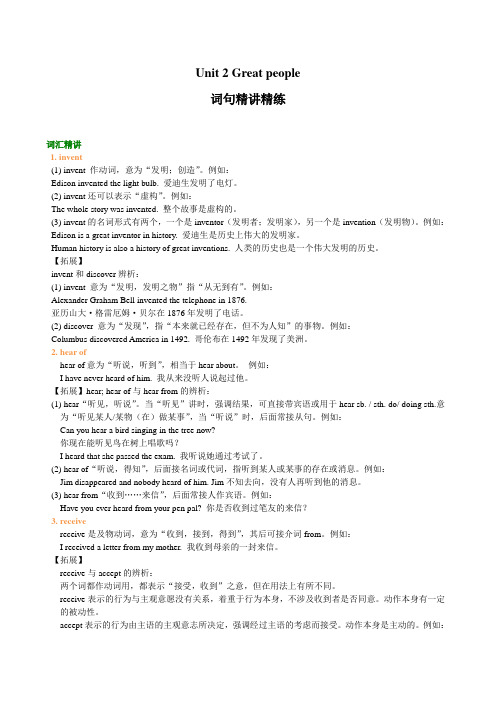
Unit 2 Great people词句精讲精练词汇精讲1. invent(1) invent 作动词,意为“发明;创造”。
例如:Edison invented the light bulb. 爱迪生发明了电灯。
(2) invent还可以表示“虚构”。
例如:The whole story was invented. 整个故事是虚构的。
(3) invent的名词形式有两个,一个是inventor(发明者;发明家),另一个是invention(发明物)。
例如:Edison is a great inventor in history. 爱迪生是历史上伟大的发明家。
Human history is also a history of great inventions. 人类的历史也是一个伟大发明的历史。
【拓展】invent和discover辨析:(1) invent 意为“发明,发明之物”指“从无到有”。
例如:Alexander Graham Bell invented the telephone in 1876.亚历山大·格雷厄姆·贝尔在1876年发明了电话。
(2) discover 意为“发现”,指“本来就已经存在,但不为人知”的事物。
例如:Columbus discovered America in 1492. 哥伦布在1492年发现了美洲。
2. hear ofhear of意为“听说,听到”,相当于hear about。
例如:I have never heard of him. 我从来没听人说起过他。
【拓展】hear; hear of与hear from的辨析:(1) hear“听见,听说”。
当“听见”讲时,强调结果,可直接带宾语或用于hear sb. / sth. do/ doing sth.意为“听见某人/某物(在)做某事”,当“听说”时,后面常接从句。
例如:Can you hear a bird singing in the tree now?你现在能听见鸟在树上唱歌吗?I heard that she passed the exam. 我听说她通过考试了。
初二英语:ReviewofUnits6-10词句精讲精练综合演练
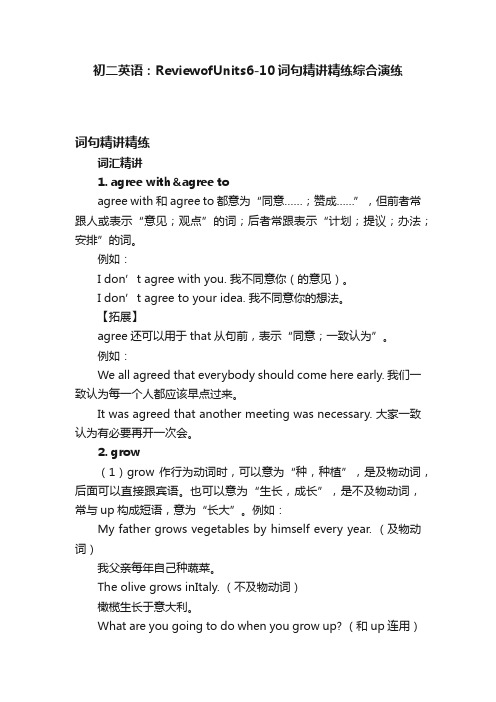
初二英语:ReviewofUnits6-10词句精讲精练综合演练词句精讲精练词汇精讲1. agree with&agree toagree with和agree to都意为“同意……;赞成……”,但前者常跟人或表示“意见;观点”的词;后者常跟表示“计划;提议;办法;安排”的词。
例如:I don’t agree with you. 我不同意你(的意见)。
I don’t agree to your idea. 我不同意你的想法。
【拓展】agree还可以用于that从句前,表示“同意;一致认为”。
例如:We all agreed that everybody should come here early. 我们一致认为每一个人都应该早点过来。
It was agreed that another meeting was necessary. 大家一致认为有必要再开一次会。
2. grow(1)grow 作行为动词时,可以意为“种,种植”,是及物动词,后面可以直接跟宾语。
也可以意为“生长,成长”,是不及物动词,常与up构成短语,意为“长大”。
例如:My father grows vegetables by himself every year. (及物动词)我父亲每年自己种蔬菜。
The olive grows inItaly. (不及物动词)橄榄生长于意大利。
What are you going to do when you grow up? (和up连用)你长大后打算干什么?(2)grow 作连系动词,意为“逐渐变得”,后接形容词作表语。
例如:Truth never grows old. 真理永远不会变老。
The world is growing smaller. 世界在逐渐变小3. can与be able to(1)be able to 和can有时可以互换,但是can只用于一般现在时和一般过去时,而be able to有多种时态形式。
译林版九年级上初三英语第二单元词句精讲精练(含答案)

Unit 2 Colours词句精讲精练词汇精讲1. wonderwonder作及物动词,意为“想知道;对……感到怀疑”,常见的用法有:(1)后接who, what,why,where 等引导的宾语从句。
例如:I wonder who she is. 我想知道她是谁。
She wondered what the child was doing.她感到疑惑,孩子究竟在干什么。
I wonder why Ann is late. 我想知道安为什么迟到了。
I wonder where they have gone. 我想知道他们去哪儿了。
(2)后接that 引导的宾语从句,表示“对……感到惊讶”,that常可省去。
例如:I wonder (that) she has won the race.我对她赢了比赛感到惊讶。
(3)后接if 或whether 引导的宾语从句,常用来表示一种委婉的请求或疑问。
例如:She wondered whether you were free that morning.她想知道你那天上午是否有空。
I wonder if he will succeed.我不知道他会不会成功。
2. come truecome true意为“(理想、梦想等)实现”。
come作系动词,表示“变得”,其后常接一些表示好的、积极的形容词,如:true; right等。
Your dream will come true if you work hard. 如果你努力工作,你的梦想会实现的。
【辨析】come true 与realizecome true和realize均可表示“实现”之意,但come true的主语常是物或事,如:愿望、理想、目标等。
例如:His wish to be an actor has come true. 他想当演员的愿望实现了。
realize是及物动词,其主语常是人。
例如:She realized her dream finally. 她最终实现了她的梦想。
仁爱版七年级英语下册ReviewofUnits5_6词句精讲精练含答案

Review of Units 5-6词句精讲精练词汇精讲1. talktalk意为“谈话”,当talk作此意讲时,不强调内容,一般指说的动作,其后常接介词to 和with,表示“与……谈话”;接介词about时表示“谈论……”。
例如:Jimmy and Bill often talk about computer games.吉米和比尔经常谈论电脑游戏。
Mary is talking with Mr. Green in English.玛丽正在用英语和格林先生交谈。
【拓展】辨析:speak、say和tell(1)speak一词强调说话的能力、对象和方式。
用作及物动词时后接表示语言的名词作宾语;用作不及物动词时,后接介词to,表示“与……讲话”,一般用于打电话用语中或较正式的情况下。
例如:They can speak Chinese. 他们会说中文。
May I speak to Mr. Black? 请问,我能和布莱克先生讲话吗?(2)say用作及物动词,强调说的内容。
若指“对某人说”用say to sb.来表示。
例如:Can you say it in English? 你能用英语说它吗?(3)tell经常作及物动词,意为“讲述,告诉”,后常接双宾语,侧重把一件事情传达给别人。
常用结构是tell sb. to do sth. 意为“告诉某人做某事”,其否定形式为tell sb. not to do sth.,意为“告诉某人不要做某事”,tell sb. about sth. 意为“告诉某人关于某事”。
例如:My mother tells me to get up early. 我妈妈告诉我早点起床。
2. makemake作使役动词,后接省略to的动词不定式,即:make sb. do sth. 意为“使/让某人做某事”,类似的动词还有let,have等。
例如:The boss made them work for long time.老板让他们长时间工作。
Module 3 Heroes 词句精讲精练

Module 3 Heroes词句精讲精练【词汇精讲】1. attendattend是及物动词,意为“出席,参加(会议、讲座、婚礼、报告等)”,不强调参加者在活动中所起的作用。
例如:attend a meeting 出席会议attend school 上学attend a class 上课He doesn’t want to attend the meeting. 他不想参加这次会议。
【拓展】join意为“加入某个组织,并成为该组织中的一员”。
例如:My father joined the army when he was twenty.我父亲二十岁时参军。
join in 意为“参加某项活动”。
例如:She joins in the game too.她也参加这个游戏。
2. whatever(1)whatever引导主语从句时,意义相当于anything that,通常译为“……任何东西(一切事情)”;无论什么……都”。
例如:Whatever she says goes. 一切她说了算。
Whatever I have is yours. 我的东西都是你的。
Whatever she did was right. 她做的一切都是对的。
(2)whatever引导让步状语从句时,相当于“no matter what”的用法。
例如:Whatever happens, I must be calm. 不管发生什么事,我都要镇静。
Whatever you say, I won’t believe you. 不管你说什么,我决不相信你的话。
3. amazing(1)amazing意为“令人吃惊的”,指某物或某事让人惊讶。
例如:What an amazing picture! 多么出奇的一幅画!(2)amazing与amazed的区别:amazed作形容词,或者被动式be amazed at (by)意为“对……大为惊奇”。
人教版九年级英语第11单元词句精讲精练
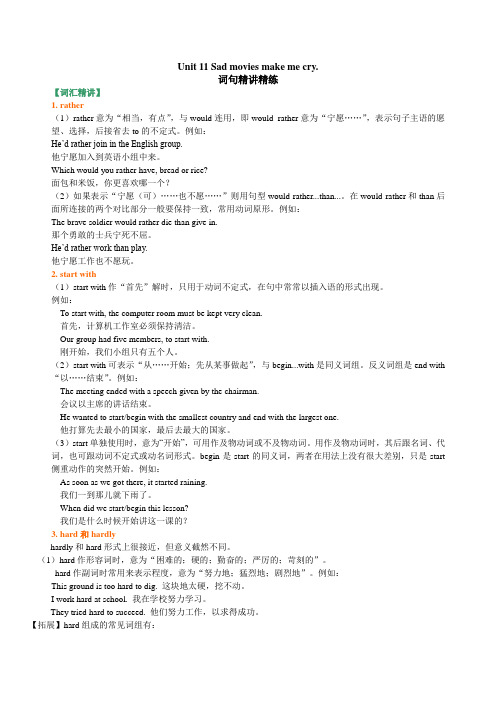
Unit 11 Sad movies make me cry.词句精讲精练【词汇精讲】1. rather(1)rather意为“相当,有点”,与would连用,即would rather意为“宁愿……”,表示句子主语的愿望、选择,后接省去to的不定式。
例如:He’d rather join in the English group.他宁愿加入到英语小组中来。
Which would you rather have, bread or rice?面包和米饭,你更喜欢哪一个?(2)如果表示“宁愿(可)……也不愿……”则用句型would rather...than...。
在would rather和than后面所连接的两个对比部分一般要保持一致,常用动词原形。
例如:The brave soldier would rather die than give in.那个勇敢的士兵宁死不屈。
He’d rather work than play.他宁愿工作也不愿玩。
2. start with(1)start with作“首先”解时,只用于动词不定式,在句中常常以插入语的形式出现。
例如:To start with, the computer room must be kept very clean.首先,计算机工作室必须保持清洁。
Our group had five members, to start with.刚开始,我们小组只有五个人。
(2)start with可表示“从……开始;先从某事做起”,与begin...with是同义词组。
反义词组是end with “以……结束”。
例如:The meeting ended with a speech given by the chairman.会议以主席的讲话结束。
He wanted to start/begin with the smallest country and end with the largest one.他打算先去最小的国家,最后去最大的国家。
译林版七年级下初一英语第三单元词句精讲精练(含答案)
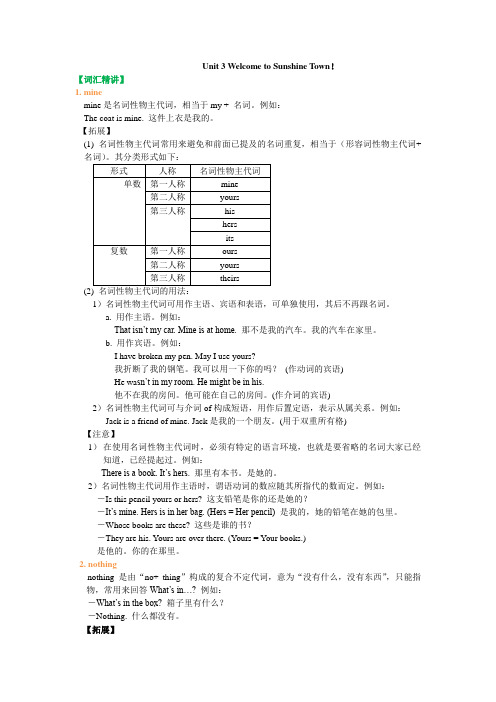
Unit 3 Welcome to Sunshine Town!【词汇精讲】1. minemine是名词性物主代词,相当于my + 名词。
例如:The coat is mine. 这件上衣是我的。
【拓展】(1) 名词性物主代词常用来避免和前面已提及的名词重复,相当于(形容词性物主代词+(2) 名词性物主代词的用法:1)名词性物主代词可用作主语、宾语和表语,可单独使用,其后不再跟名词。
a. 用作主语。
例如:That isn’t my car. Mine is at home. 那不是我的汽车。
我的汽车在家里。
b. 用作宾语。
例如:I have broken my pen. May I use yours?我折断了我的钢笔。
我可以用一下你的吗?(作动词的宾语)He wa sn’t in my room. He might be in his.他不在我的房间。
他可能在自己的房间。
(作介词的宾语)2)名词性物主代词可与介词of构成短语,用作后置定语,表示从属关系。
例如:Jack is a friend of mine. Jack是我的一个朋友。
(用于双重所有格)【注意】1)在使用名词性物主代词时,必须有特定的语言环境,也就是要省略的名词大家已经知道,已经提起过。
例如:There is a book. It’s hers. 那里有本书。
是她的。
2)名词性物主代词用作主语时,谓语动词的数应随其所指代的数而定。
例如:-Is this pencil yours or hers? 这支铅笔是你的还是她的?-It’s mine. Hers is in her bag. (Hers = Her pencil) 是我的,她的铅笔在她的包里。
-Whose books are these? 这些是谁的书?-They are his. Yours are over there. (Yours = Your books.)是他的。
译林版九年级上初三英语第三单元词句精讲精练(含答案)

Unit 3 Teenage problems词句精讲精练词汇精讲1. aloudaloud是副词,重点在“出声”,通常放在动词之后,没有比较级形式。
例如:He read the story aloud to his son. 朗读那篇故事给他儿子听。
Did I say it out aloud? 我刚才出声了么?【拓展】(1)loud可作形容词或副词。
用作副词时,常与speak, talk, laugh等动词连用,常用于比较级。
Could you please speak a little louder? 你能说大声一点吗?Am I loud enough? 我声音够大么?(2)loudly是副词, 有时可与loud替换,但常含有“打扰别人”之意。
He does not talk loudly or laugh loudly in public. 他不会当众大声谈笑。
2. reply & answer两个词都有“回答”之意,都可用作名词和动词,常可互换使用。
两词的区别是:(1)reply为正式用语,多指经过考虑的、有针对性的、详细的回答,常和介词to 连用,也可接直接引语或that引导的宾语从句。
例如:The old man smiled before he replied to my question. 老人在回答我的问题前笑了笑。
(2)answer是一般用语,用法比reply广泛,回答问题、写回信、接电话、听见门铃去开门都可用answer。
另外,你可以用言语问题,也可以摇头或耸肩作答。
例如:Answer my question in English.用英语回答我的问题。
3. choice作名词,意为“选择,选择权”,一般做可数名词。
否定形式一般常用词组“have no/little choice but to do sth.”。
例如:It's available in a choice of colours.有多种颜色可供选择。
Module4_词句精讲精练
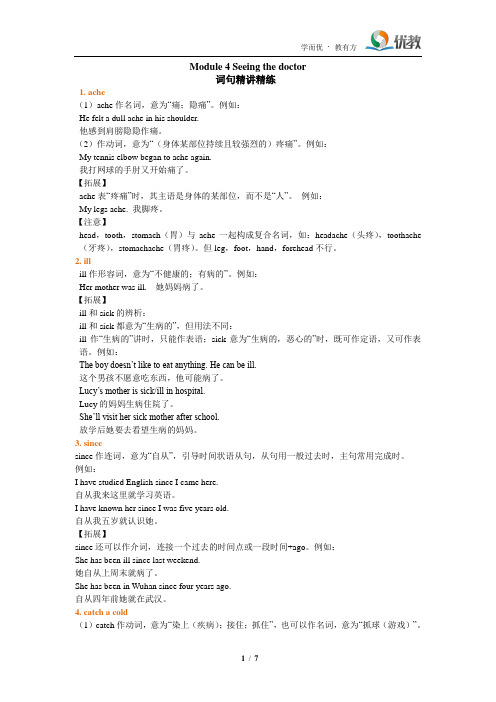
Module 4 Seeing the doctor词句精讲精练1. ache(1)ache作名词,意为“痛;隐痛”。
例如:He felt a dull ache in his shoulder.他感到肩膀隐隐作痛。
(2)作动词,意为“(身体某部位持续且较强烈的)疼痛”。
例如:My tennis elbow began to ache again.我打网球的手肘又开始痛了。
【拓展】ache表“疼痛”时,其主语是身体的某部位,而不是“人”。
例如:My legs ache. 我脚疼。
【注意】head,tooth,stomach(胃)与ache一起构成复合名词,如:headache(头疼),toothache (牙疼),stomachache(胃疼)。
但leg,foot,hand,forehead不行。
2. illill作形容词,意为“不健康的;有病的”。
例如:Her mother was ill.她妈妈病了。
【拓展】ill和sick的辨析:ill和sick都意为“生病的”,但用法不同:ill作“生病的”讲时,只能作表语;sick意为“生病的,恶心的”时,既可作定语,又可作表语。
例如:The boy doesn’t like to eat anything. He can be ill.这个男孩不愿意吃东西,他可能病了。
Lucy’s mother is sick/ill in hospital.Lucy的妈妈生病住院了。
She’ll visit her sick mother after school.放学后她要去看望生病的妈妈。
3. sincesince作连词,意为“自从”,引导时间状语从句,从句用一般过去时,主句常用完成时。
例如:I have studied English since I came here.自从我来这里就学习英语。
I have known her since I was five years old.自从我五岁就认识她。
词句精讲精练
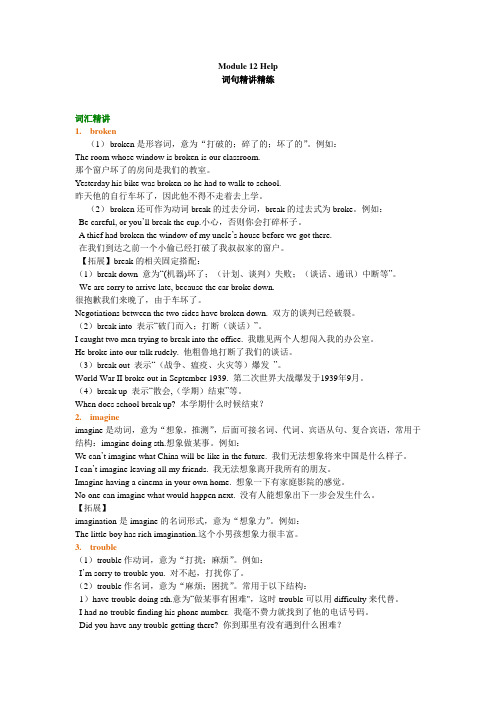
Module 12 Help词句精讲精练词汇精讲1.broken(1)broken是形容词,意为“打破的;碎了的;坏了的”。
例如:The room whose window is broken is our classroom.那个窗户坏了的房间是我们的教室。
Yesterday his bike was broken so he had to walk to school.昨天他的自行车坏了,因此他不得不走着去上学。
(2)broken还可作为动词break的过去分词,break的过去式为broke。
例如:Be careful, or you’ll break the cup.小心,否则你会打碎杯子。
A thief had broken the window of my uncle’s house before we got there.在我们到达之前一个小偷已经打破了我叔叔家的窗户。
【拓展】break的相关固定搭配:(1)break down 意为“(机器)坏了;(计划、谈判)失败;(谈话、通讯)中断等”。
We are sorry to arrive late, because the car broke down.很抱歉我们来晚了,由于车坏了。
Negotiations between the two sides have broken down. 双方的谈判已经破裂。
(2)break into 表示“破门而入;打断(谈话)”。
I caught two men trying to break into the office. 我瞧见两个人想闯入我的办公室。
He broke into our talk rudely. 他粗鲁地打断了我们的谈话。
(3)break out 表示“(战争、瘟疫、火灾等)爆发”。
World War II broke out in September 1939. 第二次世界大战爆发于1939年9月。
词句精讲精练
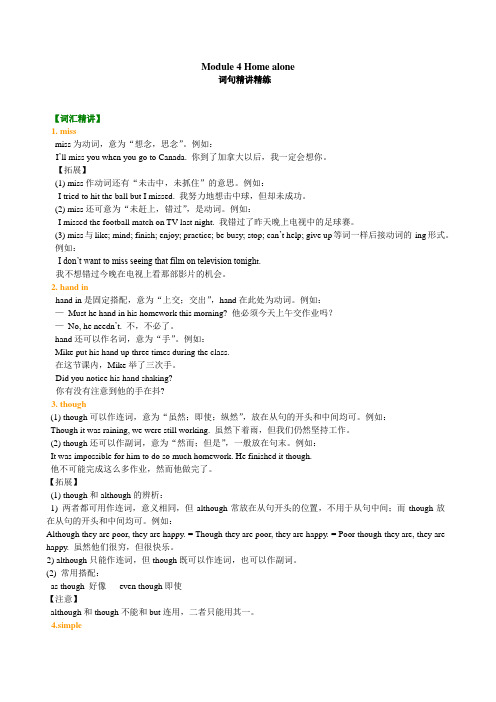
Module 4 Home alone词句精讲精练【词汇精讲】1. missmiss为动词,意为“想念,思念”。
例如:I’ll miss you when you go to Canada. 你到了加拿大以后,我一定会想你。
【拓展】(1) miss作动词还有“未击中,未抓住”的意思。
例如:I tried to hit the ball but I missed. 我努力地想击中球,但却未成功。
(2) miss还可意为“未赶上,错过”,是动词。
例如:I missed the football match on TV last night. 我错过了昨天晚上电视中的足球赛。
(3) miss与like; mind; finish; enjoy; practice; be busy; stop; can’t help; give up等词一样后接动词的-ing形式。
例如:I don’t want to miss seeing that film on television tonigh t.我不想错过今晚在电视上看那部影片的机会。
2. hand inhand in是固定搭配,意为“上交;交出”,hand在此处为动词。
例如:—Must he hand in his homework this morning? 他必须今天上午交作业吗?—No, he needn’t. 不,不必了。
hand还可以作名词,意为“手”。
例如:Mike put his hand up three times during the class.在这节课内,Mike举了三次手。
Did you notice his hand shaking?你有没有注意到他的手在抖?3. though(1) though可以作连词,意为“虽然;即使;纵然”,放在从句的开头和中间均可。
例如:Though it was raining, we were still working. 虽然下着雨,但我们仍然坚持工作。
词句精讲精练
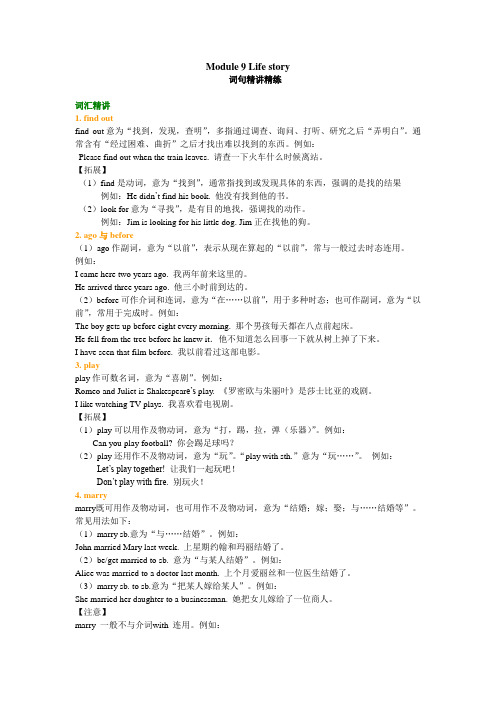
Module 9 Life story词句精讲精练词汇精讲1. find outfind out意为“找到,发现,查明”,多指通过调查、询问、打听、研究之后“弄明白”。
通常含有“经过困难、曲折”之后才找出难以找到的东西。
例如:Please find out when the train leaves. 请查一下火车什么时候离站。
【拓展】(1)find是动词,意为“找到”,通常指找到或发现具体的东西,强调的是找的结果例如:He didn’t find his book. 他没有找到他的书。
(2)look for意为“寻找”,是有目的地找,强调找的动作。
例如:Jim is looking for his little dog. Jim正在找他的狗。
2. ago与before(1)ago作副词,意为“以前”,表示从现在算起的“以前”,常与一般过去时态连用。
例如:I came here two years ago. 我两年前来这里的。
He arrived three years ago. 他三小时前到达的。
(2)before可作介词和连词,意为“在……以前”,用于多种时态;也可作副词,意为“以前”,常用于完成时。
例如:The boy gets up before eight every morning. 那个男孩每天都在八点前起床。
He fell from the tree before he knew it.他不知道怎么回事一下就从树上掉了下来。
I have seen that film before. 我以前看过这部电影。
3. playplay作可数名词,意为“喜剧”。
例如:Romeo and Juliet is Shakespear e’s play. 《罗密欧与朱丽叶》是莎士比亚的戏剧。
I like watching TV plays. 我喜欢看电视剧。
【拓展】(1)play可以用作及物动词,意为“打,踢,拉,弹(乐器)”。
译林版七年级下初一英语第二单元词句精讲精练(含答案)
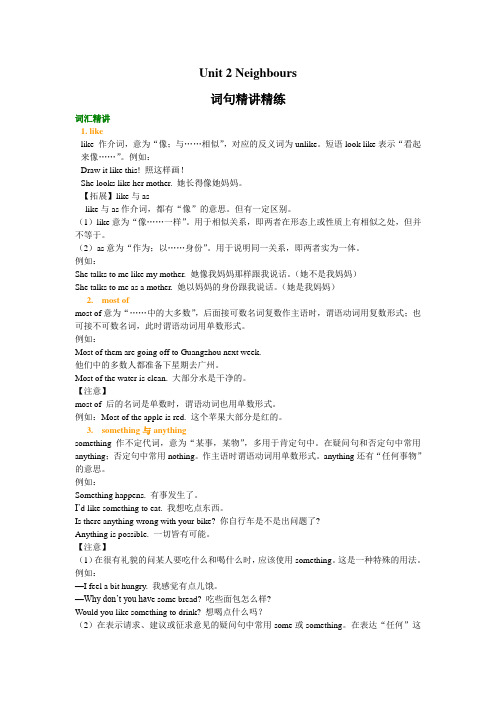
Unit 2 Neighbours词句精讲精练词汇精讲1. likelike 作介词,意为“像;与……相似”,对应的反义词为unlike。
短语look like表示“看起来像……”。
例如:Draw it like this! 照这样画!She looks like her mother. 她长得像她妈妈。
【拓展】like与aslike与as作介词,都有“像”的意思。
但有一定区别。
(1)like意为“像……一样”。
用于相似关系,即两者在形态上或性质上有相似之处,但并不等于。
(2)as意为“作为;以……身份”。
用于说明同一关系,即两者实为一体。
例如:She talks to me like my mother. 她像我妈妈那样跟我说话。
(她不是我妈妈)She talks to me as a mother. 她以妈妈的身份跟我说话。
(她是我妈妈)2.most ofmost of意为“……中的大多数”,后面接可数名词复数作主语时,谓语动词用复数形式;也可接不可数名词,此时谓语动词用单数形式。
例如:Most of them are going off to Guangzhou next week.他们中的多数人都准备下星期去广州。
Most of the water is clean. 大部分水是干净的。
【注意】most of 后的名词是单数时,谓语动词也用单数形式。
例如:Most of the apple is red. 这个苹果大部分是红的。
3.something与anythingsomething作不定代词,意为“某事,某物”,多用于肯定句中。
在疑问句和否定句中常用anything;否定句中常用nothing。
作主语时谓语动词用单数形式。
anything还有“任何事物”的意思。
例如:Something happens. 有事发生了。
I’d like something to eat. 我想吃点东西。
词句精讲精练

Module 4 Rules and suggestions词句精讲精练词汇精讲1. rule(1)rule作名词,意为“规则, 规章, 规定, 条例”。
follow/obey the rules 意为“遵守规则”; break the rules意为“违反规则”。
例如:There are a lot of rules in my family. 我们家有很多规定。
You should obey the traffic rules. 你应该遵守交通规则。
(2)rule 作动词,意为“统治; 控制”。
例如:The King ruled his people well and wisely. 这位国王贤明地统治着他的臣民。
Hilter ruled Germany for only 12 years. 希特勒统治德国仅12年。
2.sound/noise/voice(1)sound这个词的使用范围很大,大自然的任何“声音”都可以用sound来表示, 无论高低、好听难听等。
例如:At midnight he heard a strange sound. 半夜里他听到一种奇怪的声音。
(2)voice一般指人的声音,说话、唱歌等人发出的声响都可以用voice表示。
例如:Meg raised her voice. 梅格提高了她的声音。
(3)noise意为“噪音”,专指人们不喜欢或者不愿意听到的声音。
例如:Don’t make any noise! 别吵了!3 go offgo off 意为“离开,走掉,走散”。
例如:He went off in a hurry. 他匆匆走掉了。
Don’t go off the main road, or you’ll be lost. 不要离开大路,否则会迷路的。
【拓展】go off的其他用法:(1)go off 意为“发出响声”。
例如:My alarm clock didn’t go off. 我的闹钟没有响。
- 1、下载文档前请自行甄别文档内容的完整性,平台不提供额外的编辑、内容补充、找答案等附加服务。
- 2、"仅部分预览"的文档,不可在线预览部分如存在完整性等问题,可反馈申请退款(可完整预览的文档不适用该条件!)。
- 3、如文档侵犯您的权益,请联系客服反馈,我们会尽快为您处理(人工客服工作时间:9:00-18:30)。
Module 3 Journey to space词句精讲精练词汇精讲1. earthearth为名词,意为“泥土,土壤”;earth为名词,还意为“地球”,通常需要在前面加上定冠词the。
例如:The trees and grasses can stop the wind from blowing the earth away.树和草可以阻止风把土吹走。
The floor is earth but hard.虽然是泥地, 但是很坚实。
The earth goes around the sun.地球绕着太阳转。
2. reach(1)reach意为“到达”,是及物动词,可以直接接宾语。
例如:I’ll call you as soon as I reach New York.我一到达纽约就给你打电话。
When we reached the station, the train had left.当我们到达车站时,火车已经离开了。
【拓展】表示“到达”的词汇还有get to和arrive in。
例如:They arrived in Beijing yesterday. 他们昨天到的北京。
He arrives at school at eight every morning. 他每天早上八点到达学校。
When you arrive home, please give me a call. 到家的时候请给我打个电话。
They’ll get to Beijing at six tonight.他们将在今晚六点到达北京。
I’ll get there on time. 我会按时到达那里。
(2)reach意为“够得到”,后面直接接宾语。
例如:He tries to get the apple above the shelf,but fails to reach it.他尽力去够架子上的苹果,但是没够着。
3. yet(1) yet作副词,意为“到此时,至今,还,尚未”,用于否定句中。
例如:We ha ven’t heard from him yet. 我们还没有收到他的来信。
I’m not yet sure if we could win. 我还没有把握确定我们是否能赢。
(2) 作副词,意为“已经”,用于疑问句中。
例如:Is everything ready yet? 一切准备就绪了吗?Has the ship left yet? 轮船已经离开了吗?(3) 作副词,意为“仍然,还是”,用于肯定句中。
例如:He’s yet a chi ld. 他还是个孩子。
(4) 作连词,意为“然而,可是”。
例如:You can draw a horse in five minutes, yet you kept me waiting for a year, why?你能在五分钟之内画好一匹马,然而你却让我等了一年,为什么?He trained hard all year, yet she didn’t win a prize in the competition.他全年都艰苦训练,然而在竞赛中却没能获奖。
【拓展】yet和already的辨析:yet用于疑问句或否定句时,放在句末。
例如:Have you finished yet? 你完成了吗?He hasn’t done it yet. 他还没有干完呢。
already常用于肯定陈述句中,一般位于助动词之后,实义动词之前。
例如:The train has already left. 火车已经开走了。
4. alone(1) alone作副词,意为“单独地,孤独地”,相当于by oneself。
例如:It was too heavy for me to carry the bag alone. 我独自背这个袋子,真是太重了。
(2) alone作形容词,意为“单独的,独自的”,只能作表语,不能作定语。
例如:He was alone in the house. 他一个人在屋子里。
【辨析】alone和lonelyalone既可作形容词,也可作副词,表示“单独一人,无人相伴”,陈述客观事实。
lonely只能作形容词,表示“孤独的,寂寞的”,带有强烈的感情色彩;此外,还可表示“荒凉的,偏僻的”,常作定语。
例如:Though the old man is alone, he doesn’t feel lonely.虽然那位老人是一个人,但他并不感到寂寞。
My grandfather used to live in a lonely village.我爷爷过去住在一个偏僻的小村庄里。
5. discoverdiscover是动词,意为“发现”,其后可接名词、代词、疑问词+不定式及that从句等。
例如:We never discovered how to open the box. 我们从未弄清楚如何打开这个盒子。
【拓展】(1) discover意为“发现”,指有意或无意地发现已经存在尚不为人知的事物。
例如:China has discovered oil under the South China Sea. 中国在南海发现了石油。
(2) find意为“找到、发现”,指偶然发现或经过一番寻找,找到值得或所需的东西,强调找的结果。
例如:I found the book I was looking for. 我找到了一直在找的书。
(3) find out意为“查明白、弄清楚”,多用于经过调查、分析、研究等手段查出的情况,查出的东西往往是抽象的,如时间、事实、真相等。
例如:Please find out when the meeting starts. 请查一下会议什么时候开始。
(4) invent意为“发明”指经过研究、设计而创造出原本未有的东西。
例如:Cai Lun invented the paper. 蔡伦发明了纸。
6. nonenone意为“没有,都不”,表示全部否定,可指人或物,常与of 连用,后接可数名词时,谓语动词用单、复数形式均可,接不可数名词时,谓语动词只能用单数形式。
常回答how many/much的问句。
例如:—How many students are there in the classroom? 教室里有多少学生?—None. 一个也没有。
None of us likes her. 我们当中没有一个人喜欢她。
【拓展】(1)no one = nobody意为“没有人”,单独作主语,其谓语动词用单数形式,其后不能接of…结构。
在简略回答中,回答who的问句。
例如:—Who is in the room? 谁在房间里?—No one. 没有人。
Nobody will make friends with him.没有人愿意与他交朋友。
(2) nothing意为“没有什么,没有东西”,只能指物,常用来回答What’s in…? 例如:—What’s in the box? 箱子里有什么?—Nothing. 什么都没有。
7. light(1)light作不可数名词,意为“光;光亮;光线”。
例如:The sun gives out light and heat.太阳发出光和热。
He read the letter by the light of the candle.他在烛光下读那封信。
(2)light作可数名词,意为“电灯;光源”。
例如;Don’t cross the road when the traffic lights are red.当交通灯是红色时,不要横穿马路。
(3)light作形容词,意为“轻的;浅色的”。
例如:Is the box heavy or light?那箱子是重还是轻?I like the light green dress.我喜欢哪件浅绿色的裙子。
(4)light作动词,意为“点燃;照亮”。
例如:He sat down and lit a cigarette.他坐下来,点了一支烟。
8. finishfinish意为“完成,结束”,作及物动词时,其后可跟名词、代词或动名词。
即:finish sth.或finish doing sth.。
例如:I finished my homework this morning. 我今天上午做完了作业。
When did you finish drawing the picture? 你什么时候画完那副画的?【拓展】能接v.-ing作宾语的动词还有:practice; enjoy; mind; keep等。
practice doing sth. 练习做某事enjoy doing sth.喜欢做某事mind doing sth.介意做某事keep doing sth. 一直做某事词汇精练I. 英汉短语互译。
1.be up to ________________2.far away_________________3.on the earth _______________4.billions of ________________5.as… as…________________6.没问题________________7.上网________________8.搜索________________9.多于,超过________________10.和某人交流________________II. 根据句意和首字母提示完成单词。
1.There are s______ books on the shelf.2.There is the earth,the sun,the moon and many other stars in the u______.3.We are a______ on the island,but we don't feel lonely.4.She's j______ eaten her lunch.5.How do you change our e______?6.We sent the i______ to the earth.7.He's g______ to Beijing,so you can’t see him now.III. 用括号内所给词的适当形式填空。
1.We all know the earth ______(go)around the sun.2.There are ______(billion)of stars in our galaxy.3.My mother isn't at home.She ______(go)to Shanghai.So my father and I should take care of my old grandma.4.How large is the universe? No one ______(know).5.I have finished ______(read)the book.1. Have you______ been to New York?2.I haven't been to New York______.But I'll go there this summer.3.I don't believe your family has owned a truck ______ over 90 years.4.My parents are _______ late for work. They always get up early.5.He’s ______ told his parents about his plans.【参考答案】I. 英汉短语互译。
